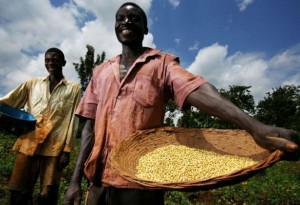EurActiv | 02 April 2010
To increase food security in developing countries, the European Commission has suggested that small-scale farmers must be supported and efforts must be made to ensure that their land rights are respected.
Most of the world's poor and hungry live in rural areas, where small-scale agriculture constitutes the main economic activity, notes the European Commission in a policy paper published on 31 March.
As a consequence, the Commission believes "sustainable small-scale food production should be the focus of EU assistance to increase the availability of food in developing countries".
The policy paper on food security in the developing world was adopted as part of the EU executive's 'spring package' on development and in the framework of this year's mid-term review of the UN's Millennium Development Goals (MDG). One of those goals is to halve the proportion of the world's population that suffers from hunger by 2015.
The paper notes that EU aid should prioritise "sustainable and ecologically efficient" farm intensification approaches, by optimising agricultural inputs and supporting integrated pest management, improved soil and water management and stress-resistant crop varieties, for example.
Increasing income, regional cooperation
The Commission believes that access to food should be enhanced by creating better employment and income-earning opportunities in both rural and urban areas, especially via diversification and trade, thus making food more affordable for more people. It suggests that in rural areas, new jobs could be created in agricultural processing by small and medium-sized enterprises.
To tackle vitamin and mineral deficiencies, the EU should also include a nutritional dimension to developing countries' agriculture programmes. Nutrition policies and strategies could cover the diversification of smallholder agriculture and promote the production of micronutrient-rich food, especially local varieties and species, for example.
The Commission also encourages the EU to "step up efforts in supporting regional integration in developing countries," as closer regional integration can help prevent economic, political and food security crises, as well as mitigate their effects.
To address price volatility, the EU executive suggests increasing market transparency as regards data on production, reserves and prices, adequate stocks kept by private traders and discouraging export restrictions.
Land grabs
The Commission also plans to launch a joint initiative with the African Union to accelerate the implementation of the African Land Policy Guidelines. The initiative will include a roadmap for the implementation of "sustainable large-scale investments in farmland".
The EU executive particularly highlights the need to protect the land rights and secure access to natural resources of smallholder farmers and pastoral communities.
The initiative comes as so-called 'land grabs', or the large-scale acquisition of farmland, gain ground in Africa, Latin America and Central and South-East Asia, with private investors and governments investing in farm projects beyond their borders, either as part of a strategy to secure basic food supplies or simply for profit (EurActiv 11/09/09).
The UN Food and Agriculture Organisation (FAO) is also currently developing guidelines for land acquisition. It has already outlined a number of general recommendations for investors, host governments, civil society organisations and international development agencies on the matter.












